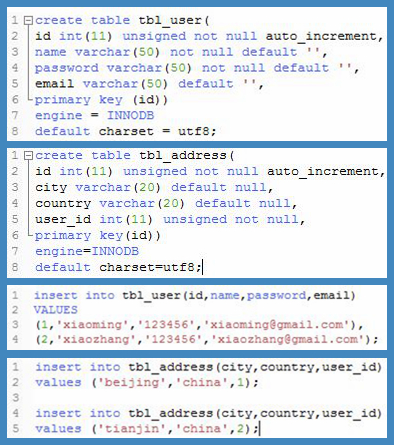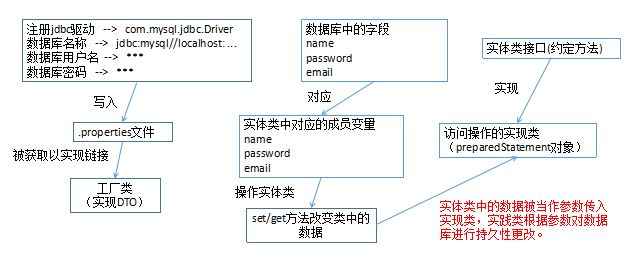- 增删改查
- 事务处理
- DTO&DAO使用
先建两张表,分别插入两条数据供后面使用。
命令行固然炫酷,但Navicat更友好,当然workbench也可以啦。随意随意
1、增删改查
/**基本的增删改查正如代码中注释,就是那四步:
*1、注册jdbc驱动;2、获取数据库连接;3、创建statement对象;4、调用executeUpdate()方法;
*/
public class JDBCTest {
public static Connection getConnection(){
Connection conn = null;
try {
Class.forName("com.mysql.jdbc.Driver");//注册mysql的jdbc驱动程序
conn=DriverManager.getConnection("jdbc:mysql://localhost:3306/jsp_db","root","123456");//获取数据库连接
} catch (Exception e) {
e.printStackTrace();
}
return conn;
}
public static void insert(){
Connection conn = getConnection();
try {
String sql = "insert into tbl_user(name,password,email)" +
"values('Tom','123456','tom@gmail.com')";
Statement st = conn.createStatement();//创建statement对象
int count = st.executeUpdate(sql);//调用statement对象的executeUpdate()方法执行sql语句
System.out.println("向用户表中插入了"+ count + "条记录");
conn.close();
} catch (Exception e) {
e.printStackTrace();
}
}
public static void update(){
Connection conn = getConnection();
try {
String sql = "update tbl_user SET email='tom@126.com' where name = 'TOM'";
Statement st = conn.createStatement();
int count = st.executeUpdate(sql);
System.out.println("向用户表中更新了"+ count + "条记录");
conn.close();
} catch (Exception e) {
e.printStackTrace();
}
}
public static void delete(){
Connection conn = getConnection();
try {
String sql = "delete from tbl_user where name = 'TOM'";
Statement st = conn.createStatement();
int count = st.executeUpdate(sql);
System.out.println("向用户表中删除了"+ count + "条记录");
conn.close();
} catch (Exception e) {
e.printStackTrace();
}
}
public static void main(String[] args) {
//insert();
//update();
delete();
}
}2、事务处理
当涉及多表同时操作,可能会数据操作不完整而导致坑爹的后果,因此要引入事务处理以保证数据的一致性。
事务:一个操作序列,要么都执行要么都不执行,具有原子性、一致性、隔离性、持久性。
主要调用方法是:提交commit()、回滚rollback()
//错误的同时插入方式,导致只能插入部分数据,破坏了数据的完整性
public class TransactionTest {
//获取数据库连接
public static Connection getConnection(){
Connection conn=null;
try{
Class.forName("com.mysql.jdbc.Driver");
conn = DriverManager.getConnection("jdbc:mysql://localhost:3306/jsp_db","root","123456");
}catch(Exception e){
e.printStackTrace();
}
return conn;
}
public static void insertUserData(){
Connection conn = getConnection();
try{
String sql="insert into tbl_user(id, name, password, email)"+
"values(10,'Tom','123456','tom@gmail.com')";
Statement st=conn.createStatement();
int count=st.executeUpdate(sql);
System.out.println("向用户表插入了" + count +"条记录");
conn.close();
}catch(Exception e){
e.printStackTrace();
}
}
public static void insertAddressData(){
Connection conn = getConnection();
try{
String sql="insert into tbl_address(id, city, country, user_id)"+
"values(1, 'shanghai', 'china', '10')";
Statement st=conn.createStatement();
int count=st.executeUpdate(sql);
System.out.println("向地址表中插入了" + count + "条记录");
}catch(Exception e){
e.printStackTrace();
}
}
public static void main(String[] args) {
insertUserData();
insertAddressData();
}
}
//通过利用回滚进行事务管理的正确方式
public class TransactionTest {
// 获取数据库连接
public static Connection getConnection() {
Connection conn = null;
try {
Class.forName("com.mysql.jdbc.Driver");
conn = DriverManager.getConnection(
"jdbc:mysql://localhost:3306/jsp_db", "root", "123456");
} catch (Exception e) {
e.printStackTrace();
}
return conn;
}
//将异常抛出给调用方法
public static void insertUserData(Connection conn) throws SQLException {
String sql = "insert into tbl_user(id, name, password, email)"
+ "values(10,'Tom','123456','tom@gmail.com')";
Statement st = conn.createStatement();
int count = st.executeUpdate(sql);
System.out.println("向用户表插入了" + count + "条记录");
}
public static void insertAddressData(Connection conn) throws SQLException {
String sql = "insert into tbl_address(id, city, country, user_id)"
+ "values(1, 'shanghai', 'china', '10')";
Statement st = conn.createStatement();
int count = st.executeUpdate(sql);
System.out.println("向地址表中插入了" + count + "条记录");
}
public static void main(String[] args) {
Connection conn = null;
try {
conn = getConnection();
conn.setAutoCommit(false);//禁止事务自动提交
} catch (Exception e) {
// TODO: handle exception
}
try {
insertUserData(conn);
insertAddressData(conn);
conn.commit();//提交事务
} catch (Exception e) {
System.out.println("*****************catch exception********************");
e.printStackTrace();
try{
conn.rollback();
System.out.println("*************************rollback successful*****************************");
} catch(Exception e2){
e2.printStackTrace();
}
}finally{
try {
if(conn!=null){
conn.close();
}
} catch (Exception e3) {
e3.printStackTrace();
}
}
}
}3、DTO&DAO使用
DTO(data transfer object):封装数据传输对象,不包含业务逻辑
//新建dbconfig.properties属性文件,加入以下键值对
driver=com.mysql.jdbc.Driver
dburl=jdbc\:mysql\://localhost\:3306/jsp_db
user=root
password=123456
//新建连接工厂类
public class ConnectionFactory {
//为属性文件中的键值对声明四个成员变量
private static String driver;
private static String dburl;
private static String user;
private static String password;
//声明类对象,由于是单例模式直接定义成了final类型
private static final ConnectionFactory factory = new ConnectionFactory();
//声明存储连接的connection对象
private Connection conn;
//用java的静态代码块读取属性文件的配置信息,静态代码块用于初始化类,为类的属性赋值,只会执行一次
static{
Properties prop = new Properties(); //定义一个Properties类,继承自hashtable,存储键值对
try {
InputStream in = ConnectionFactory.class.getClassLoader() //获取属性文件的内容,先获取文件加载器然后读取内容
.getResourceAsStream("dbconfig.properties");
prop.load(in); //从输入流中读取属性列表
} catch (Exception e) {
System.out.println("******************配置文件读取错误**********************");
}
//赋值给定义的成员变量
driver = prop.getProperty("driver");
dburl = prop.getProperty("dburl");
user = prop.getProperty("user");
password = prop.getProperty("password");
}
//默认的构造函数,注意是私有
private ConnectionFactory(){
}
//用于获取connectionFactory实例,这里使用了单例模式,以保证在程序运行期间只有一个connectionFactory实例存在
public static ConnectionFactory getInstance(){
return factory;
}
public Connection makeConnection(){
try {
Class.forName(driver);
conn=DriverManager.getConnection(dburl, user, password);
} catch (Exception e) {
e.printStackTrace();
}
return conn;
}
}
//测试数据库连接是否成功
public class ConnectionFactoryTest {
public static void main(String[] args) throws Exception{
ConnectionFactory cf = ConnectionFactory.getInstance();
Connection conn = cf.makeConnection();
System.out.println(conn.getAutoCommit());
}
}DAO(data access object):数据访问对象,用于封装数据访问
//创建超类
public abstract class IdEntity {
protected Long id;
public Long getId(){
return id;
}
public void setId(Long id){
this.id=id;
}
}
//创建实体子类
package com.csdn.entity;
public class User extends IdEntity {
private String name;
private String password;
private String email;
public String getName() {
return name;
}
public void setName(String name) {
this.name = name;
}
public String getPassword() {
return password;
}
public void setPassword(String password) {
this.password = password;
}
public String getEmail() {
return email;
}
public void setEmail(String email) {
this.email = email;
}
@Override
public String toString() {
return "User [name=" + name + ", password=" + password + ", email="
+ email + ", id=" + id + "]";
}
}
//声明接口,定义实现类的访问操作,约定行为
public interface UserDao {
public void save(Connection conn, User user) throws SQLException;
public void update(Connection conn, Long id, User user) throws SQLException;
public void delete(Connection conn, User user) throws SQLException;
}
//实现接口
public class UserDaoImpl implements UserDao {
// 保存
@Override
public void save(Connection conn, User user) throws SQLException {
// preparedStatement用于执行参数化查询,?为占位符
PreparedStatement ps = conn
.prepareCall("insert into tbl_user(name,password,email) values (?,?,?)");
// 索引由1开始
ps.setString(1, user.getName());
ps.setString(2, user.getPassword());
ps.setString(3, user.getEmail());
ps.execute();
}
// 更新
@Override
public void update(Connection conn, Long id, User user) throws SQLException {
String updateSql = "update tbl_user set name = ?, password = ?, email = ? where id = ?";
PreparedStatement ps = conn.prepareStatement(updateSql);
ps.setString(1, user.getName());
ps.setString(2, user.getPassword());
ps.setString(3, user.getEmail());
ps.setLong(4, id);
}
// 删除
@Override
public void delete(Connection conn, User user) throws SQLException {
PreparedStatement ps = conn
.prepareStatement("delete from tbl_user where id = ?");
ps.setLong(1, user.getId());
ps.execute();
}
}总结:整体流程(拿ppt随便画的)
























 1365
1365

 被折叠的 条评论
为什么被折叠?
被折叠的 条评论
为什么被折叠?








